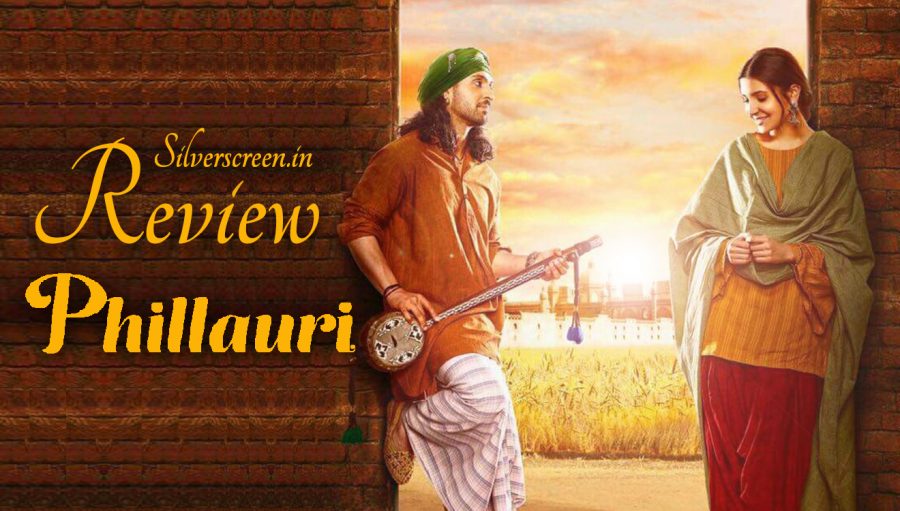There is palpable innocence at the core of Phillauri. The film’s central character, a spirit named Shashi (Anushka Sharma), would fit into a Studio Ghibli universe. She appears, sprinkles powdery light everywhere, is awestruck by human beings, and occasionally remarks that the world today is so different from her days. At heart, the film is an old-fashioned love story – slow, gentle and unpretentious.
And through the beautiful poetry and alluring music woven into the narrative, Phillauri speaks of art’s eternal, infinite capabilities.
*****
There are curious scenes which hint that Shashi is from a distant time. The morning she lands in a palatial house that belongs to a wealthy Punjabi family, she flies to a chandelier and tries to blow off the electric lights. At an engagement ceremony, Shashi is taken aback by the bride’s gown because it bares her upper back. “Oh my God, she is nangi (nude)!” she says, before discreetly trying to cover the bride with a dupatta.
Shashi isn’t at the house to jump out of wardrobes and scare away the inmates. She just doesn’t know how she ended up there: a house which is preparing for a grand wedding.
*****
This adorable bewilderment is shared by Kanan (Suraj Sharma), the 26-year-old Canada-returned scion of the household. Also, the only human being who can see Shashi. He feels out of place in the sprawling family house which has been transformed into a big fat wedding venue.
As the film proceeds, much like a ballad, we see the spirit and the human bonding over their mutual cluelessness. Kanan accidentally becomes Shashi’s “husband” when he “marries” the tree where Shashi had been living for 98 years, as instructed by an astrologer. He helps her hide in his house. In turn, when he feels that life is too much to take, she helps him calms down.
***
The narrative criss-crosses between a brightly-coloured present, and a warm-toned past set in 1919.
In her own timeline, Shashi, sister of an erudite physician, falls in love with Roop Lal (Diljit), a musician and village heartthrob. Her idealism helps him find purpose in life. His sense of liberation opens up the world for Shashi, who had always lived under the strict and watchful eyes of her brother. In one scene, her friend is shocked to hear that Shashi is pregnant. She asks Shashi if she is not ashamed to have slept with him. At first, Shashi nods her head in affirmation. Soon though, she bursts into a mischievous smile, and says “no”.
Anushka Sharma, playing a Punjabi woman from the early 20th century, doesn’t have much of a makeover. She nails her role with sheer acting prowess. Her face is a delight for close-up shots. When grieving, she doesn’t simply burst into tears. She masterfully breaks down the emotion into pieces – shock, disbelief, realisation, denial, and finally, acceptance. The first time Roop Lal comes and sits by her as she is writing poetry, she blushes, and a tint of red appears naturally on her cheek.
***
Kanan’s homecoming is curiously similar to that of Dev in Dev D. A performance by a local band, a cheesy gesture of welcome by family members, and an ecstatic childhood sweetheart. Like Dev, Kanan feels out of place in the house. Things are moving a little too fast. And the time he spent in Canada has built a sea of differences between him and his bride, Anu, a starry-eyed girl who is head over heels in love with him.
However, the sequence is overdrawn and forced. A nightmare in which he falls off the terrace; scene after scene of him smoking to relieve his tension; a number of pointless and corny exchanges between him and Anu on his confused state of mind.
In a scene where the family gets together to discuss Kanan’s issues, he says he wants to find himself before entering wedlock. His mother responds by dragging him in front a mirror. Instead of just having a proper chat with this innocuous young man, there is an overt and loud attempt to be witty.
*****
Given its sensitivity to human emotions, Phillauri has one ugly part that runs against the grain of the rest of the film. A young dwarf works as a servant in Kanan’s house. The boy run away in fear when Kanan gestures at him to be quiet, while pointing at Shashi, who is standing by his bed. The dwarf misinterprets it as an invitation for sex, and the film tries to play on that as comedy.
Perhaps he had come across too many such gestures in his vulnerable life. The sequence is unnecessarily long, and tasteless.
It’s going to take Bollywood a lot more time to learn that rape jokes are not funny.
*****
The film has an excellent production department that perfectly brings to life a bygone era. The mud-coloured jute and cotton clothes that the actors wear, the hand-written notes that Shashi and Roop Lal exchange, and the dusty village square – everything looks like it belongs in the story.
Recommended
The male actors, Suraj and Diljit, are equally effective in their roles. There is a curious role-reversal in Phillauri, where it’s a man who is an object of desire. We are introduced to Roop Lal through his sculpted body and his enthralling performance at the village square, which draws a huge female crowd. Fully aware of his beauty, Diljit is flawless in the role.
Phillauri, with a soul that exudes so much light and warmth, is a delightful watch.
*****
The Phillauri review is a Silverscreen original article. It was not paid for or commissioned by anyone associated with the movie. Silverscreen.in and its writers do not have any commercial relationship with movies that are reviewed on the site.



